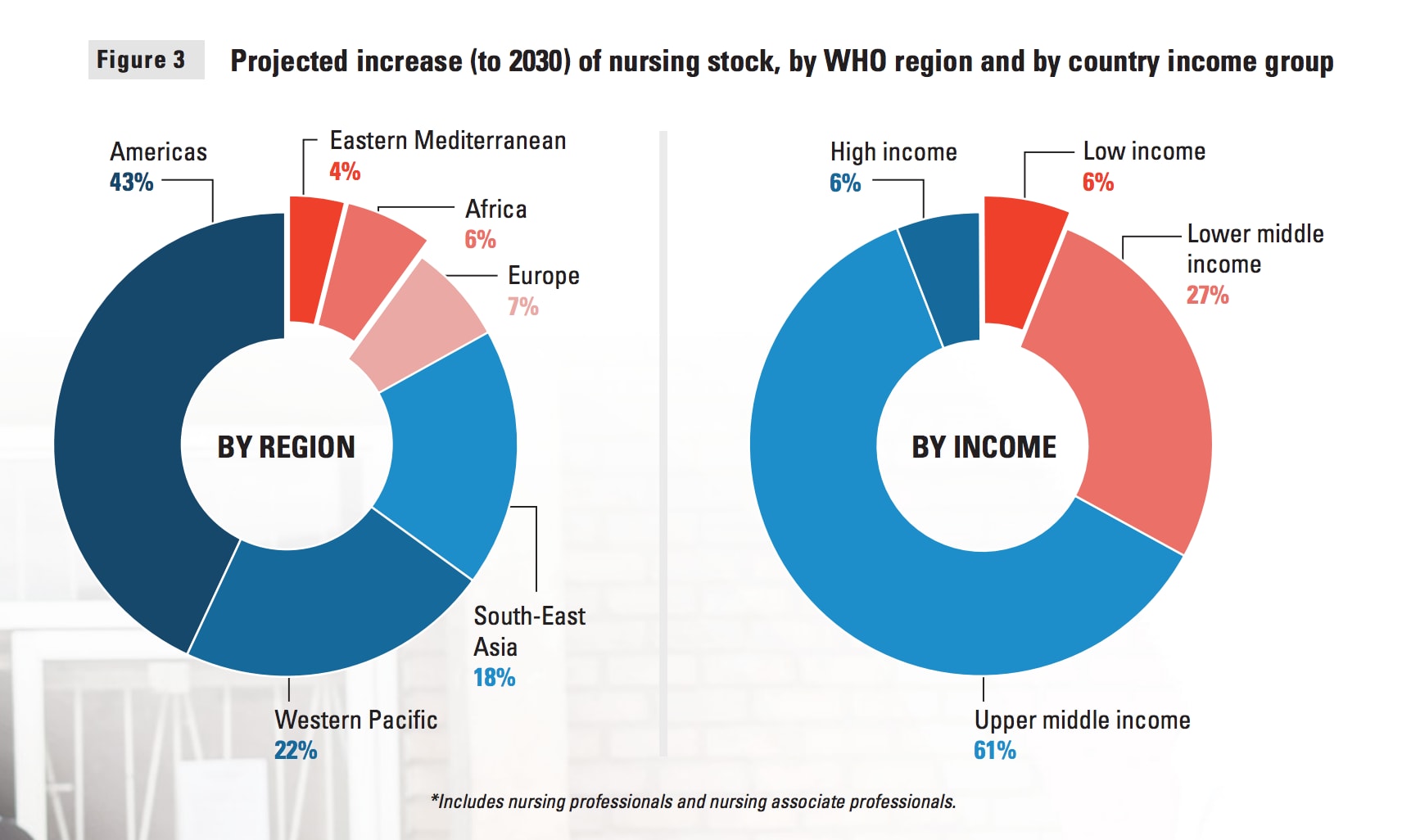On World Health Day, new report says the world needs 6 million more nurses

In the middle of the COVID-19 pandemic, WHO celebrates nurses – and says the world needs more of them. Image: REUTERS/Annegret Hilse
- The world needs 6 million more nurses to achieve global health targets.
- Low and lower middle-income countries suffer the most acute nurse shortages.
- On World Health Day, WHO calls for investment in a massive acceleration of nursing education.
As global health systems creak under the strain of the coronavirus, a new report shows there are not enough nurses to meet global development goals on health – even without a global pandemic.
The World Health Organization (WHO) report, State of the World's Nursing, estimates there was a global shortage of 5.9 million nurses in 2018, a slight improvement from the 6.6 million shortage in 2016.
The report has been published on World Health Day, an annual event organized by WHO, which this year is focused on supporting nurses and midwives, many of whom are serving on the frontlines of the COVID-19 response.
"Nurses and health workers are at the forefront of COVID-19 response, working tirelessly to care for everyone’s loved ones, even when their own lives are at risk," said Dessislava Dimitrova, Head of Healthcare Transformation at the World Economic Forum. "As we clap daily to express our appreciation for the health workers around the globe, let us not lose sight of the investments that they need to be strong enough to ensure that everyone, everywhere gets the healthcare they need."
“The nursing workforce is expanding in size and professional scope. However, the expansion is not equitable, is insufficient to meet rising demand, and is leaving some populations behind," the authors write.
They call for the creation of at least 6 million new nursing jobs by 2030, primarily in low- and middle-income countries, to achieve the global development goals on health. Sustainable Development Goal 3 aims to ensure healthy lives and promote well-being at all ages, which includes the provision of universal health coverage.

There are 27.9 million nurses around the world, an increase of 4.7 million between 2013 and 2018. Over 80% of those nurses are found in countries that account for half of the world’s population.
Low and lower middle-income countries, where the growth in the number of nurses is barely keeping pace with population growth, are suffering the most acute shortages. The report estimates that these countries need a further 5.3 million nurses to meet their requirements.
The report states that the total number of nurse graduates would need to increase by 8% per year on average, alongside an improved capacity to employ and retain these graduates, to address the shortage by 2030 in all countries.

As well as creating new nursing jobs, the report urges governments to:
- invest in the massive acceleration of nursing education to address global needs, meet domestic demand, and respond to changing technologies and new models of integrated health and social care;
- strengthen nurse leadership to ensure that nurses have an influential role in forming health policy and decision-making, and contribute to the effectiveness of health and social care systems.
Countries should develop workforce policies that take account of the fact that the nursing workforce is still predominantly female, the authors write. Laws addressing the gender pay gap must apply to both the public sector and the private sector, and encourage flexible and manageable working hours.
“[This report] comes as the world witnesses unprecedented political commitment to universal health coverage. At the same time, our emergency preparedness and response capacity is being tested by the current COVID-19 outbreak and mass population displacement caused by conflict. Nurses provide vital care in each of these circumstances. Now, more than ever, the world needs them working to the full extent of their education and training," says the report.
191 countries provided data for the report, which was developed in partnership with the International Council of Nurses and the global Nursing Now campaign.
What is the World Economic Forum doing about the coronavirus outbreak?
Don't miss any update on this topic
Create a free account and access your personalized content collection with our latest publications and analyses.
License and Republishing
World Economic Forum articles may be republished in accordance with the Creative Commons Attribution-NonCommercial-NoDerivatives 4.0 International Public License, and in accordance with our Terms of Use.
The views expressed in this article are those of the author alone and not the World Economic Forum.
Stay up to date:
COVID-19
Forum Stories newsletter
Bringing you weekly curated insights and analysis on the global issues that matter.
More on Health and Healthcare SystemsSee all
Mansoor Al Mansoori and Noura Al Ghaithi
November 14, 2025








